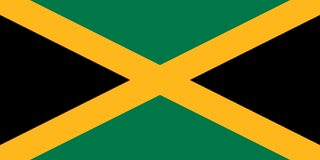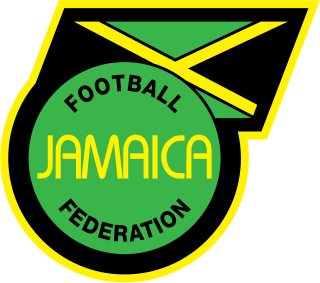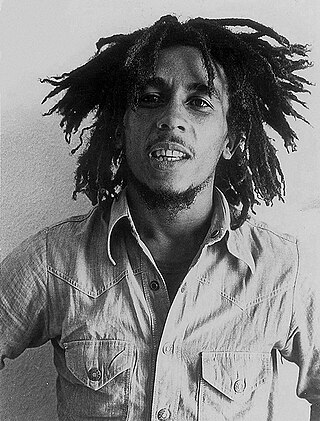Related Research Articles

Jamaica is an island country in the Caribbean Sea and the West Indies. At 10,990 square kilometres (4,240 sq mi), it is the third largest island—after Cuba and Hispaniola—of the Greater Antilles and the Caribbean. Jamaica lies about 145 km (90 mi) south of Cuba, 191 km (119 mi) west of Hispaniola, and 215 km (134 mi) south-east of the Cayman Islands.

Reggae is a music genre that originated in Jamaica in the late 1960s. The term also denotes the modern popular music of Jamaica and its diaspora. A 1968 single by Toots and the Maytals, "Do the Reggay", was the first popular song to use the word reggae, effectively naming the genre and introducing it to a global audience. Reggae is rooted out from traditional Jamaican Kumina, Pukkumina, Revival Zion, Nyabinghi, and burru drumming. Jamaican reggae music evolved out of the earlier genres mento, ska and rocksteady. Reggae usually relates news, social gossip, and political commentary. It is instantly recognizable from the counterpoint between the bass and drum downbeat and the offbeat rhythm section. The immediate origins of reggae were in ska and rocksteady; from the latter, reggae took over the use of the bass as a percussion instrument.

Ska is a music genre that originated in Jamaica in the late 1950s and was the precursor to rocksteady and reggae. It combined elements of Caribbean mento and calypso with American jazz and rhythm and blues. Ska is characterized by a walking bass line accented with rhythms on the off beat. It was developed in Jamaica in the 1960s when Stranger Cole, Prince Buster, Clement "Coxsone" Dodd, and Duke Reid formed sound systems to play American rhythm and blues and then began recording their own songs. In the early 1960s, ska was the dominant music genre of Jamaica and was popular with British mods and with many skinheads.

Kingston is the capital and largest city of Jamaica, located on the southeastern coast of the island. It faces a natural harbour protected by the Palisadoes, a long sand spit which connects the town of Port Royal and the Norman Manley International Airport to the rest of the island. Kingston is the largest English-speaking city south of the United States in the Western Hemisphere.

Rastafari, sometimes called Rastafarianism, is an Abrahamic religion that developed in Jamaica during the 1930s. It is classified as both a new religious movement and a social movement by scholars of religion. There is no central authority in control of the movement and much diversity exists among practitioners, who are known as Rastafari, Rastafarians, or Rastas.
Dancehall is a genre of Jamaican popular music that originated in the late 1970s. Initially, dancehall was a more sparse version of reggae than the roots style, which had dominated much of the 1970s. In the mid-1980s, digital instrumentation became more prevalent, changing the sound considerably, with digital dancehall becoming increasingly characterized by faster rhythms. Key elements of dancehall music include its extensive use of Jamaican Patois rather than Jamaican standard English and a focus on the track instrumentals.

Port Royal is a town located at the end of the Palisadoes, at the mouth of Kingston Harbour, in southeastern Jamaica. Founded in 1494 by the Spanish, it was once the largest and most prosperous city in the Caribbean, functioning as the centre of shipping and commerce in the Caribbean Sea by the latter half of the 17th century. It was destroyed by an earthquake on 7 June 1692 and its accompanying tsunami, leading to the establishment of Kingston, which is now the largest city in Jamaica. Severe hurricanes have regularly damaged the area. Another severe earthquake occurred in 1907.

The prime minister of Jamaica is Jamaica's head of government, currently Andrew Holness. Holness, as leader of the governing Jamaica Labour Party (JLP), was sworn in as prime minister on 7 September 2020, having been re-elected as a result of the JLP's landslide victory in the 2020 Jamaican general election.

Jamaica is a neighborhood in the New York City borough of Queens. It is mainly composed of a large commercial and retail area, though part of the neighborhood is also residential. Jamaica is bordered by Hollis to the east; St. Albans, Springfield Gardens, Rochdale Village to the southeast; South Jamaica to the south; Richmond Hill and South Ozone Park to the west; Briarwood to the northwest; and Kew Gardens Hills, Jamaica Hills, and Jamaica Estates to the north.

Sean Paul Ryan Francis Henriques is a Jamaican dancehall deejay. Paul's first album, Stage One, was released in 2000. He gained international fame with his second album, Dutty Rock, in 2002. Its single "Get Busy" topped the US Billboard Hot 100 chart in the United States, as did "Temperature", off his third album, The Trinity (2005).

Montego Bay is the capital of the parish of St. James in Jamaica. The city is the fourth-largest urban area in the country by population, after Kingston, Spanish Town, and Portmore, all of which form the Greater Kingston Metropolitan Area, home to over half a million people. As a result, Montego Bay is the second-largest anglophone city in the Caribbean, after Kingston.

The Jamaica national football team, nicknamed the "Reggae Boyz", represents Jamaica in international football. The team's first match was against Haiti in 1925. The squad is under the supervising body of the Jamaica Football Federation (JFF), which is a member of the Caribbean Football Union (CFU), Confederation of North, Central American and Caribbean Association Football (CONCACAF), and the global jurisdiction of FIFA. Jamaica's home matches have been played at Independence Park since its opening in 1962.

Jamaican Patois is an English-based creole language with West African, Taíno, Irish, Scots, Scottish Gaelic, Spanish, Hindustani, Portuguese, Chinese, and German influences, spoken primarily in Jamaica and among the Jamaican diaspora. Words or slang from Jamaican Patois can be heard in other Caribbean countries, the United Kingdom, New York City and Miami in the United States, and Toronto, Canada. The majority of non-English words in Patois derive from the West African Akan language. It is spoken by the majority of Jamaicans as a native language.

The Jamaica Football Federation (JFF) is the governing body of football in Jamaica and is in charge of the Jamaica national football team and the Jamaica Premier League.

Usain St. Leo Bolt is a retired Jamaican sprinter, widely considered to be the greatest sprinter of all time. He is an eight-time Olympic gold medalist and the world record holder in the 100 metres, 200 metres, and 4 × 100 metres relay.

Robert Nesta Marley was a Jamaican reggae singer, guitarist, and songwriter. Considered one of the pioneers of the genre, he fused elements of reggae, ska and rocksteady and was renowned for his distinctive vocal and songwriting style. Marley increased the visibility of Jamaican music worldwide and made him a global figure in popular culture. He became known as a Rastafarian icon, and he infused his music with a sense of spirituality. Marley is also considered a global symbol of Jamaican music and culture and identity and was controversial in his outspoken support for democratic social reforms. Marley also supported the legalisation of cannabis and advocated for Pan-Africanism. In 1976, Marley survived an assassination attempt in his home, which was believed to be politically motivated.

The monarchy of Jamaica is a system of government in which a hereditary monarch is the sovereign and head of state of Jamaica. The current Jamaican monarch and head of state, since 8 September 2022, is King Charles III. As sovereign, he is the personal embodiment of the Jamaican Crown. Although the person of the sovereign is equally shared with 14 other independent countries within the Commonwealth of Nations, each country's monarchy is separate and legally distinct. As a result, the current monarch is officially titled King of Jamaica and, in this capacity, he and other members of the royal family undertake public and private functions domestically and abroad as representatives of the Jamaican state. However, the monarch is the only member of the royal family with any constitutional role.
Afro-Jamaicans are Jamaicans of predominantly African descent. They represent the largest ethnic group in the country.

Jamaicans are the citizens of Jamaica and their descendants in the Jamaican diaspora. The vast majority of Jamaicans are of Sub-Saharan African descent, with minorities of Europeans, Indians, Chinese, Middle Eastern, and others of mixed ancestry. The bulk of the Jamaican diaspora resides in other Anglophone countries, namely Canada, the United States and the United Kingdom. Jamaican populations are also prominent in other Caribbean countries, territories and Commonwealth realms, where in the Cayman Islands, born Jamaicans, as well as Caymanians of Jamaican origin, make up 26.8% of the population. Outside of Anglophone countries, the largest Jamaican diaspora community lives in Central America, where Jamaicans make up a significant percentage of the population.

The Crown Colony of Jamaica and Dependencies was a British colony from 1655, when it was captured by the English Protectorate from the Spanish Empire. Jamaica became a British colony from 1707 and a Crown colony in 1866. The Colony was primarily used for sugarcane production, and experienced many slave rebellions over the course of British rule. Jamaica was granted independence in 1962.
References
- ↑ Cundall, Frank. (1915) Historic Jamaica. London: Institute of Jamaica. pp. xviii-xix.